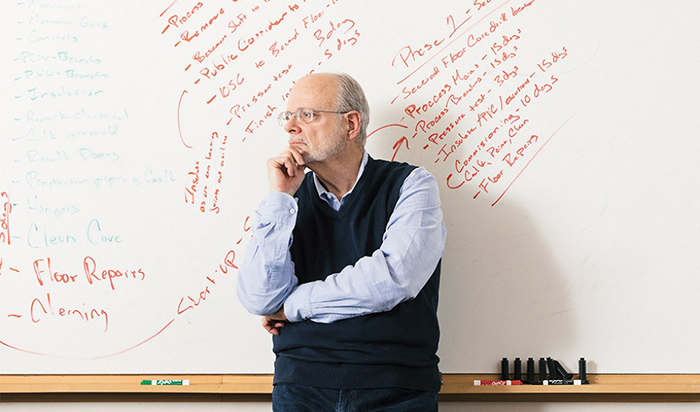
Many Duke faculty members have been working for years on topics that are suddenly of intense interest. Following are some examples of Duke scholarship and engagement that pre-date COVID-19 but are newly relevant.
Faculty scholarship
The quest for an AIDS vaccine
https://alumni.duke.edu/magazine/articles/quest-aids-vaccine
As the nation awaits a coronavirus vaccine, Duke’s expertise in vaccines goes deep: In its pursuit of an AIDS vaccine, the Duke Human Vaccine Institute has received a total of $639 million, distributed over 21 years. This Duke Magazine piece details how Dr. Barton Haynes, director of Duke’s Human Vaccine Institute in the Department of Medicine, and his team have built an operation that does basic research, manufactures vaccine components and conducts clinical trials. They’ve also built a worldwide, multidisciplinary collaboration of scientists who work as if they all belong to the same lab.
Duke experts and the federal government
https://today.duke.edu/2017/04/duke-dc-conference-focuses-pandemic-preparedness
In April 2017, Duke in DC hosted a conference focused on pandemic preparedness for the new administration in Washington. Duke experts discussed the ties between national security and pandemic prevention. The conference kicked off a quarterly seminar series, “Beyond Talking Points,” designed to share Duke’s expertise and convene government officials in an engaging, educational setting.
Pandemics and the poor
https://www.brookings.edu/blog/future-development/2017/06/19/pandemics-and-the-poor/
Duke-Margolis and Duke Global Health Institute (DGHI) member Dr. Gavin Yamey and Ben Oppenheim of the Brookings Institution co-authored a 2017 blog post putting forward a four-point plan for protecting the poor from pandemic disease outbreaks. Pandemics disproportionately affect the poor in terms of morbidity and mortality and in terms of economic circumstances.
International collective action for epidemic and pandemic preparedness
https://www.sciencedirect.com/science/article/pii/S2214109X17302036
In 2017, Dr. Gavin Yamey, Duke-Margolis Center for Health Policy and DGHI member, and colleagues published their recommendations in Lancet Global Health. They recommended strengthening international cooperation and preparedness, including supporting global efforts to accelerate research and development of vaccines, drugs, and diagnostics for outbreak control. Their collaboration grew out of a workshop held at the National Academy of Medicine by the Duke Center for Policy Impact in Global Health and the Coalition for Epidemic Preparedness Innovations (Oslo, Norway).
Engagement and initiatives
Lessons learned from 1918: New Diagnostics, Novel Therapies and Surveillance Are Central to Pandemic Prevention
https://globalhealth.duke.edu/media/news/new-diagnostics-novel-therapies-and-surveillance-are-central-pandemic-prevention
In 2018, as the world marked a century since the flu pandemic of 1918, three infectious disease experts at the Duke Global Health Institute shared their thoughts on the best strategies for prevention and containment of a future outbreak. Sherryl Broverman, Gregory Gray and Gayani Tillekeratne discussed the state of global preparedness, the latest tools and technologies that could be deployed and how Duke research projects are contributing to surveillance in Vietnam, Malaysia, Sri Lanka and around the world.
Winter Forum PANDEMIC 2011
https://globalhealth.duke.edu/media/news/dghi-simulates-infectious-disease-outbreak-winter-forum-pandemic-2011
In January 2011, more than 100 Duke undergraduate students took part in a three-day immersive academic experience that imagined a fictional pandemic. The educational event, sponsored by the Duke Global Health Institute and the Office of Undergraduate Education, sketched out a simulation of a disease outbreak that began in China. After a keynote address by U.S. Assistant Surgeon General Anne Schuchat, students assumed various roles and began grappling with important questions related to emergency preparedness, surveillance, response, vaccine development and access, ethics and the role of the public and media.
Books
“The AIDS Pandemic: Searching for a Global Response”
https://www.amazon.com/AIDS-Pandemic-Searching-Global-Response/dp/3319484311
By Dr. Michael H. Merson, Wolfgang Joklik Professor of Global Health and the director of the SingHealth Duke-National University of Singapore (NUS) Global Health Institute
This 2017 book traces the history of the global response to the AIDS pandemic, focusing especially on the role of the World Health Organization (WHO). The strategies adopted, the roads taken and not taken, and the lessons learned are offered as guidance for future global pandemics. Author Dr. Michael H. Merson was vice president and vice provost for global affairs at Duke until 2018. The book was coauthored with Stephen Inrig, professor at Mount Saint Mary's University and a Duke alumnus.
https://today.duke.edu/2017/10/merson-book-sheds-light-crucial-unknown-work-aids-pandemic-crisis
“Contagious: Cultures, Carriers, and the Outbreak Narrative”
By Priscilla Wald, R. Florence Brinkley Distinguished Professor of English
https://www.dukeupress.edu/contagious
https://www.amazon.com/Contagious-Cultures-Carriers-Outbreak-Narrative/dp/0822341530
How should we understand the fear and fascination over a new infectious disease we see both in scientific publications and the mainstream media? Duke English professor Priscilla Wald argues that the stories we tell about disease emergence have consequences. She begins by describing the history of microbiology and virology and analyzes the stigmatizing of individuals and groups -- from “Typhoid Mary” to HIV/AIDS.
Duke University Press
https://www.dukeupress.edu/Explore-Subjects/Syllabi/Navigating-Pandemic-Syllabus
Duke University Press is providing free access to its many books and journal articles that relate to the current crisis in order to help build knowledge and understanding of how we navigate the spread of communicable diseases. Listed books are free to read online until June 1, 2020, and journal articles are free until Oct. 1.
Alumni
On the coronavirus beat
Duke Magazine highlights alumni who have been on the front lines of reporting on viral pandemics: Emily Feng ’15, the Beijing correspondent for NPR, described Wuhan’s empty streets as the coronavirus was first identified in China. Her work recalled reporting by Phil Tinari ’01, who, on his second day on the job as a researcher and translator for The New York Times bureau in Beijing in 2003, found himself in Guangdong province interviewing “snake and civet mongers” with the Times’ two bureau chiefs.
https://alumni.duke.edu/magazine/articles/editor-coronavirus-beat